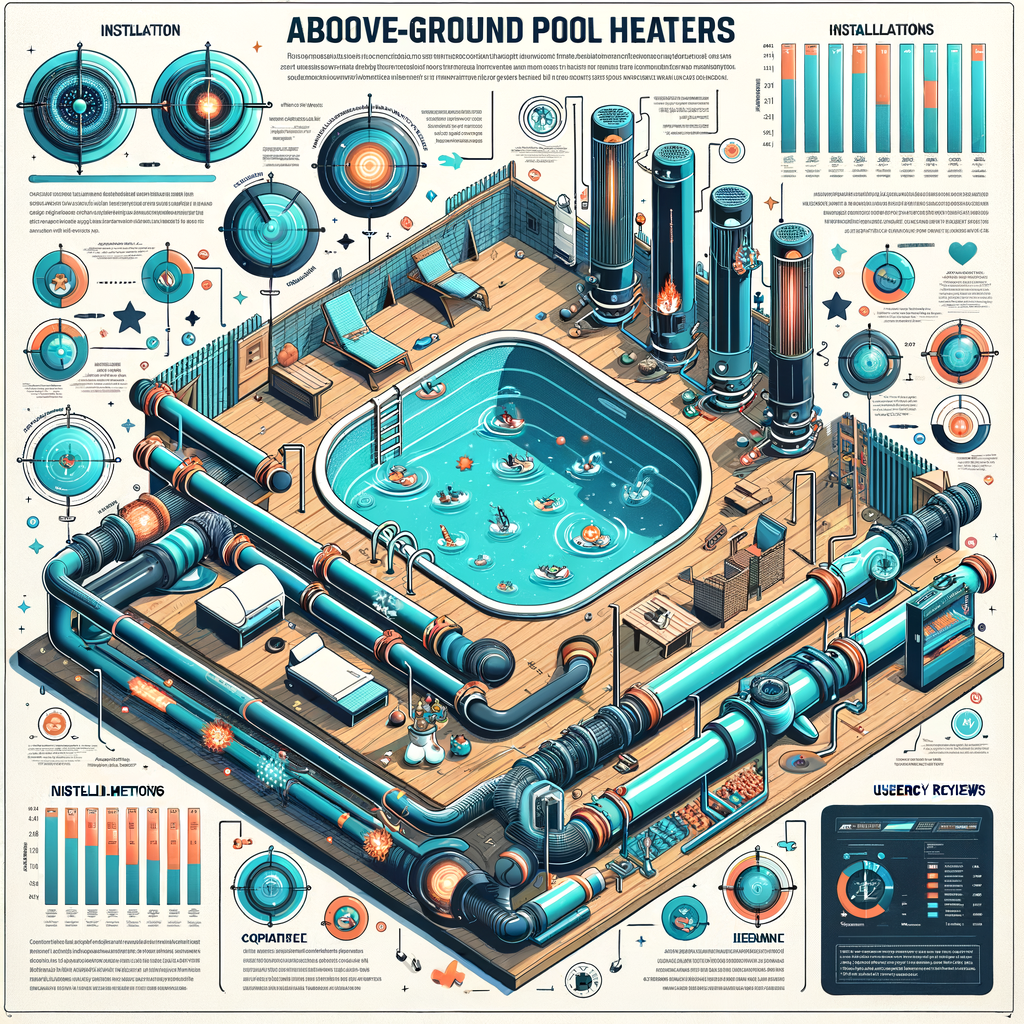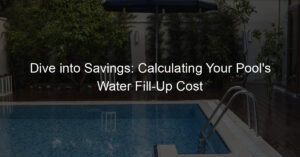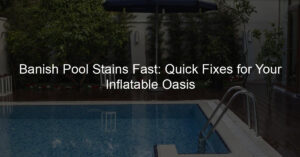
Introduction to Above-Ground Pool Heaters
Swimming is a fun and relaxing activity that many people enjoy. However, the water temperature can sometimes be a bit too chilly, making it uncomfortable to swim. This is where above-ground pool heaters come in. In this section, we will define what an above-ground pool heater is and discuss its importance.
-
- Definition of Above-ground pool heater
An above-ground pool heater is a device that is designed to raise the temperature of the water in your swimming pool. It works by using energy, either from electricity, gas, or the sun, to generate heat. This heat is then transferred to the pool water, making it warmer and more comfortable for swimming. Above-ground pool heaters are specifically designed for above-ground pools, which are pools that are not built into the ground but are instead placed on top of it.
-
- Importance of pool heaters
Pool heaters are important for several reasons. First, they allow you to control the temperature of your pool water, making it more comfortable for swimming. This is especially beneficial during cooler months when the water can be too cold for swimming. Second, pool heaters can extend your swimming season. Without a heater, you might only be able to use your pool during the hot summer months. But with a heater, you can enjoy your pool even in the spring and fall. Lastly, a pool heater can add value to your pool and your home. It is an investment that can increase the usability and enjoyment of your pool.
In the following sections, we will delve into how pool heaters work, the different types of pool heaters available, our top picks for the best pool heaters, and how to install and maintain your pool heater. We will also discuss the cost of above-ground pool heaters. So, let’s dive in!
How Pool Heaters Work
To understand the magic behind a warm and inviting pool, we need to dive into the mechanics of how pool heaters work. Let’s break it down into simple terms.
General Working Principle
The operation of a pool heater is based on two main principles. Let’s explore them:
-
- Heat exchange process:
The heart of any pool heater is the heat exchanger. This is where the magic happens. The heat exchanger is a device that transfers heat from one medium to another. In the case of a pool heater, the heat exchanger transfers heat from a source (like a gas flame or electric heating element) to the pool water.
-
- Energy transfer to the pool water:
Once the heat exchanger has absorbed the heat, it’s time to transfer that warmth to the pool water. The pool water is circulated through the heat exchanger. As the water passes through, it absorbs the heat and then returns to the pool warmer than before. This process continues until the pool reaches your desired temperature.
So, in simple terms, a pool heater works by taking heat from a source, transferring it to the pool water, and then circulating the warmed water back into the pool. This process keeps your pool at a comfortable temperature, no matter what the weather is like outside.
Specifics of Above-Ground Pool Heating Systems
When it comes to heating your above-ground pool, there are certain unique features and efficiencies to consider. Let’s delve into these specifics.
-
- Unique features of above-ground pool heaters
Above-ground pool heaters are designed with several unique features that set them apart. Firstly, they are generally smaller and more compact than in-ground heaters, making them perfect for above-ground pools of various sizes. They are also easier to install and maintain, thanks to their accessible design. Moreover, these heaters often come with adjustable thermostats, allowing you to control the temperature of your pool water with ease.
-
- Efficiency of above-ground pool heaters
Efficiency is a key aspect when it comes to above-ground pool heaters. These heaters are designed to heat pool water quickly and maintain the desired temperature effectively. They do so by using less energy compared to traditional in-ground heaters, which can result in significant energy savings over time. In fact, some above-ground pool heaters can convert up to 95% of their energy into heat, making them a highly efficient choice for your pool heating needs.
In conclusion, above-ground pool heaters are not only unique in their features but also efficient in their operation. They provide a practical and cost-effective solution for maintaining a comfortable swimming environment in your above-ground pool.
Types of Pool Heaters
When it comes to heating your pool, there are several options available. Each type of pool heater has its own advantages and disadvantages, and the best choice depends on your specific needs and circumstances. Let’s take a closer look at the three main types of pool heaters: gas heaters, electric heaters, and solar heaters.
-
- Gas Heaters
Gas heaters are a popular choice for many pool owners. They use either natural gas or propane to heat the water. These heaters are known for their speed as they can heat a pool quicker than the other types. However, they can be more expensive to operate due to the cost of gas. They are also less energy-efficient than electric or solar heaters.
-
- Electric Heaters
Electric heaters, also known as heat pumps, use electricity to capture heat and move it from one place to another. They are more energy-efficient than gas heaters, making them a more cost-effective option in the long run. However, they take longer to heat the pool compared to gas heaters. They work best in climates where the air temperature is typically above 45 degrees.
-
- Solar Heaters
Solar heaters are the most energy-efficient option. They use solar panels to capture heat from the sun and use it to heat the pool. While they have higher upfront costs, they can save you money in the long run due to their low operating costs. However, their effectiveness depends on the amount of sunlight they can capture, so they may not be the best choice in areas with less sunny days.
Choosing the right pool heater depends on various factors such as your budget, your pool size, and your local climate. It’s important to consider all these factors before making a decision.
Best Pool Heaters: Top Picks
When it comes to heating your pool, the right choice of heater can make all the difference. Let’s dive into the top picks for pool heaters in different categories.
Pool Heater Reviews
-
Review of Top-Rated Gas Heaters
Gas heaters are a popular choice for many pool owners. They heat quickly and are very efficient. One of the top-rated gas heaters is the Hayward H400FDN Universal H-Series. It’s known for its energy efficiency and durability. The heater has a digital LED control panel that makes it easy to adjust the temperature. It’s also environmentally friendly with low NOx emissions.
-
Review of Top-Rated Electric Heaters
Electric heaters are a great option for those who want a cost-effective and eco-friendly way to heat their pool. The EcoSmart SMART POOL 27 Electric Tankless Pool Heater is one of the top-rated electric heaters. It’s compact, easy to install, and can be controlled remotely. It also has a flow sensor that reduces the risk of overheating.
-
Review of Top-Rated Solar Heaters
Solar heaters are the most energy-efficient and environmentally friendly way to heat your pool. The SunQuest Solar Pool Heater is a top-rated solar heater. It’s easy to install, and it can raise the pool temperature by up to 10 degrees. Plus, it’s a great way to reduce your carbon footprint.
Choosing the right pool heater depends on your specific needs and preferences. Whether you prefer a gas, electric, or solar heater, these top picks are sure to keep your pool warm and inviting.
Key Takeaways
-
- Pros and Cons of Each Type
When it comes to pool heaters, each type has its own set of advantages and disadvantages. Gas heaters, for instance, are known for their rapid heating capabilities. They can heat your pool quickly, regardless of the outside temperature. However, they can be quite expensive to operate due to the cost of gas.
Electric heaters, on the other hand, are more energy-efficient and less costly to run. They are also quieter and require less maintenance than gas heaters. But they take longer to heat the pool and may not be as effective in colder climates.
Solar heaters are the most eco-friendly option. They harness the power of the sun to heat your pool, resulting in zero operating costs. But they depend heavily on the weather and may not work effectively on cloudy days or during the winter months.
-
- Best Overall Pick
After careful review and comparison, the top pick for the best above-ground pool heater is the electric heater. While it may take a bit longer to heat the pool, its energy efficiency, lower operating costs, and minimal maintenance make it a standout choice for most pool owners. However, the best choice ultimately depends on your specific needs, budget, and local climate conditions.
Above-Ground Pool Heater Installation
Installing an above-ground pool heater can seem like a daunting task, but with the right guidance, it can be a straightforward process. This section will provide a step-by-step guide to help you through the installation process and also discuss some common challenges you might face and how to overcome them.
Step-by-step Guide
- Step 1: Choose the right location for your pool heater. It should be close to the pool and the power source, but not in a place where it can get wet.
- Step 2: Connect the pool heater to the pool’s water system. This involves attaching the heater to the pool’s pump and filter system using PVC pipes.
- Step 3: Connect the pool heater to the power source. This may require professional help, especially if it involves electrical wiring.
- Step 4: Test the pool heater to ensure it’s working properly. Turn it on and check if the water is getting heated.
- Step 5: Regularly maintain your pool heater to ensure it remains in good working condition. This includes cleaning and servicing it as per the manufacturer’s instructions.
Common Installation Challenges and Solutions
While installing an above-ground pool heater, you might encounter some challenges. Here are some common ones and their solutions:
- Challenge 1: Difficulty in finding the right location for the heater. Solution: Choose a location that is close to the pool and the power source, but away from areas that can get wet.
- Challenge 2: Difficulty in connecting the heater to the pool’s water system. Solution: Refer to the manufacturer’s instructions or seek professional help.
- Challenge 3: Difficulty in connecting the heater to the power source. Solution: It’s best to hire a professional for this step to avoid any electrical mishaps.
- Challenge 4: The pool heater is not working properly. Solution: Check if the heater is properly connected to the water system and the power source. If the problem persists, contact the manufacturer or a professional.
Pool Heater Maintenance
Keeping your pool heater in good shape is essential for its longevity and efficiency. Regular maintenance can prevent common issues and ensure your pool stays warm all year round. Let’s dive into some routine maintenance tips and common problems you might encounter with your pool heater.
- Routine Maintenance Tips
Proper maintenance of your pool heater can save you from costly repairs and replacements. Here are some tips to help you keep your pool heater running smoothly:
- Regular Cleaning: Keep your pool and heater clean. Debris and dirt can clog the heater and reduce its efficiency. Use a pool skimmer to remove leaves and other debris from the pool regularly.
- Check the Water Chemistry: Maintain the right balance of chemicals in your pool. High acidity or alkalinity can damage the heater.
- Inspect Regularly: Regularly check your pool heater for signs of wear and tear. Look out for leaks, rust, or any unusual noises.
- Professional Inspection: Have a professional inspect and service your pool heater at least once a year. They can spot and fix issues that you might miss.
Even with regular maintenance, you might encounter some common issues with your pool heater. Here are some problems and their solutions:
- Heater Won’t Turn On: This could be due to a tripped circuit breaker or a faulty thermostat. Check these components and replace them if necessary.
- Heater Isn’t Heating the Pool: This might be due to a dirty filter or low gas pressure. Clean the filter and check the gas supply.
- Heater is Leaking: This could be due to a damaged seal or gasket. You might need to replace these parts.
- Noisy Heater: This could be due to a faulty motor or pump. Have a professional inspect and repair these parts.
Remember, if you’re unsure about any aspect of pool heater maintenance or repair, it’s best to consult a professional. Regular maintenance and timely repairs can keep your pool heater running efficiently for years to come.
Above-Ground Pool Heater Cost
When considering an above-ground pool heater, it’s important to understand the costs involved. These can be broken down into three main categories: the cost of different types of heaters, the cost of installation, and the cost of maintenance.
-
- Cost of Different Types of Heaters
The cost of an above-ground pool heater can vary greatly depending on the type of heater you choose. For instance, solar pool heaters are the most economical, ranging from $100 to $300. Electric pool heaters, on the other hand, can cost between $500 and $2,000, while gas pool heaters can range from $1,000 to $3,000. It’s important to remember that while some heaters may have a higher upfront cost, they may be more energy-efficient and cost less to operate in the long run.
-
- Installation Cost
The cost of installing an above-ground pool heater can also vary, depending on the complexity of the installation and the rates of the professional installer. On average, you can expect to pay between $200 and $500 for installation. However, this cost can be higher if additional electrical or gas lines need to be installed.
-
- Maintenance Cost
Maintenance costs for above-ground pool heaters can also vary. Solar heaters generally have the lowest maintenance costs, as they have fewer moving parts and don’t require fuel. Electric and gas heaters, on the other hand, may require more regular maintenance and the cost of fuel to operate. On average, you can expect to spend between $50 and $200 per year on maintenance.
In conclusion, while the upfront cost of an above-ground pool heater can be significant, it’s important to also consider the long-term costs of operation and maintenance. By doing your research and considering all of these factors, you can make an informed decision that best suits your needs and budget.
Conclusion
As we reach the end of our comprehensive guide on above-ground pool heaters, let’s take a moment to recap the key points and reflect on the importance of making the right choice.
-
- Recap of the Importance and Benefits of Pool Heaters
Pool heaters are a crucial component of any above-ground pool. They provide a comfortable swimming environment, regardless of the weather conditions. They extend your swimming season, allowing you to enjoy your pool for longer periods throughout the year. Moreover, pool heaters can increase the value of your property, making them a worthwhile investment.
-
- Final Thoughts on Choosing the Best Pool Heater
Choosing the best pool heater depends on various factors such as your budget, the size of your pool, and your heating needs. Remember, the best pool heater is not necessarily the most expensive one, but the one that suits your specific requirements. Consider the different types of pool heaters, their pros and cons, and the costs associated with installation and maintenance. Make an informed decision that will provide you with the most benefits in the long run.
In conclusion, a pool heater is more than just a luxury; it’s a practical investment that enhances your swimming experience and adds value to your property. So, take your time, do your research, and choose the pool heater that best meets your needs and preferences. Happy swimming!













